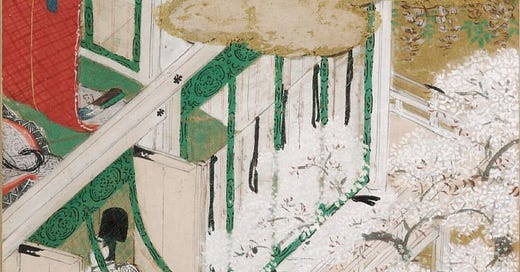In the brutally dry air of Los Angeles -- the soft, low mountains never moved when I was growing up. Always standing there, they were always the same. Until I left home, I thought all mountains must be like that: immovable and never-changing. But in Japan, I was surprised to discover that the great Mount Fuji was often veiled from sight. Hidden behind clouds, mist and dust—even those living in its shadow, sometimes forgot it was there.
This was even more true in Tokyo. In the tangle of train lines and surging waves of people living on that vast and dusty plain, mountains were easily forgotten. But maybe that is what made it so much more magical when the mountains did appear on some rare particularly clear winter day, when suddenly you would be taken completely aback—for there was Mount Fuji, standing in the distance. It never ceased to surprise me, “Wow! Was that mountain really there all along?”
The moon in Japan is like that too.
In California, the moon was always the moon… bright in the cloudless sky. But spring in Japan is hazy.
There is a great word included in Nakanishi Susumu’s The Japanese Linguistic Landscape (genius translation by Ryan Shaldjian Morrison).
Hanagumori 花曇りCloudy skies over cherry blossoms in full bloom
Hanagumori is another expression of the season’s contradictory character: layers of clouds spread out across the sky while cherry blossoms bloom wildly underneath. Rain may start to fall any moment, it seems
Hana means flower but unless otherwise indicated in poetry it could only mean cherry blossoms. And that is part of the feeling of being in the moment too. For spring in Japan is hazy and unpredictable. One never knows when it might rain so it is better to enjoy the flowers before the scene is obscured by mist, haze or rain showers,,,,
This all is a long and roundabout way of thinking about the lady of the hour’s name in chapter 8.
Genji’s latest victim?
Oborozukiyo means misty moon night… 朧 means unclear, like when the moon is blurred behind clouds or haze—not brilliant and distinct like on a clear autumn night, which is the time people do moon-viewing.
朧月夜
おぼろ月よ
The lady, whom Genji refers to as Oborozukiyo, was reciting (or singing?) a poem of that name when he first met her. She refused to give him her name so he called her that name, after the song—which was a song ultimately derived from Tang China…. (Spring night in Jialing’ section of the Bai Shi Wenji.)
Doesn’t it seem like every page of Genji is a celebration of things from China? The glorious continent and origin of all glamor and wisdom during the Heian period.
照りもせず曇りもはてぬ春の夜の朧月夜にしくものぞなき」(大江千里)
Neither clear or bright
Nor covered in clouds
The misty moon of springtime is beyond compare
Ōe no Chisato (大江千里) is one of my favorite ancient poets. he was a Japanese waka poet and Confucian scholar of the late ninth and early tenth centuries. This poem was included in the Shinkokinwakashu imperial poetry collection.
Maybe someone else can make a better translation.





Aces, Leanne. And there is no "better" just "various shades" of interpretation. ;)
I really appreciated the youtube link, it's so great to hear poetry read. I always have issues on where to break up Japanese sentences even in prose, so thank you for this! and I love your translation!